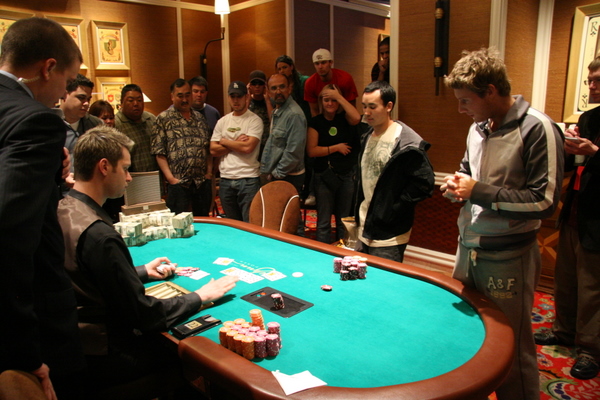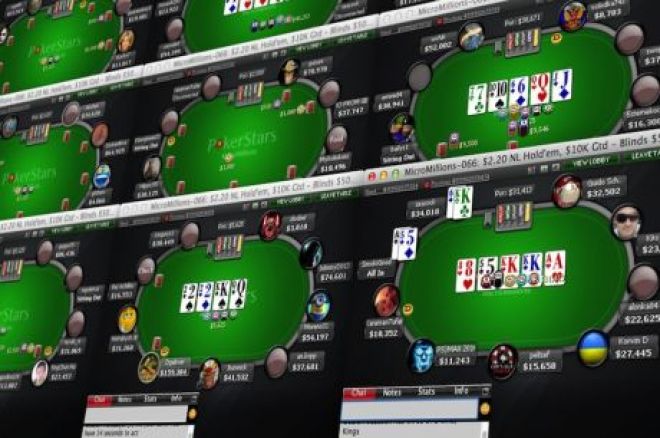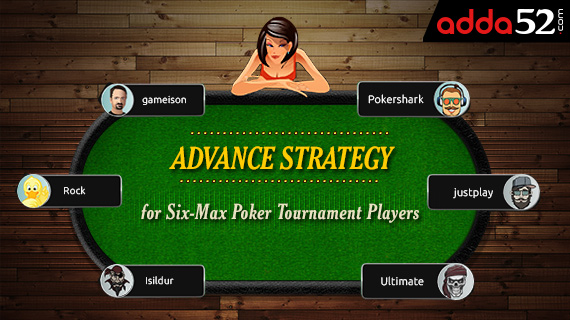Strategy For Big Poker Tournaments
The best tournament poker strategy is to recognize the three stages of any poker tournament and to have a distinct tournament poker strategy for each of the vital crunch times during a poker tournament. There are two approaches you can use when playing the early stages of a poker tournament. The first is the conservative approach. Large-Field Poker Tournament Strategy 1. Stay out of the action early on if you aren’t a big favorite You’ll see a lot of players who think they need to double-up right away or they’re out. The best tournament poker strategy is to recognize the three stages of any poker tournament and to have a distinct tournament poker strategy for each of the vital crunch times during a poker tournament. There are two approaches you can use when playing the early stages of a poker tournament. The first is the conservative approach. Short Stack Poker Tournament Strategy: 15 Big Blinds and Below. Strategies for Playing Poker on the Bubble. Poker Strategy: Big Blind Math and 16-30 Big Blinds. This is why aggressive play is the correct strategy in poker tournaments. When you then consider again that aggression is important in no limit poker, you can start to see why aggression is the focal point of your strategy in no limit poker tournaments. The Playing Chicken with a Chicken Strategy.
Card Player Magazine, available in print and online, covers poker strategy, poker news, online and casino poker, and poker legislation. Sign up today for a digital subscription to access more than 800 magazine issues and get 26 new issues per year!
One of my students recently played a hand at a $550 buy-in live tournament that illustrates an exploitative play you can make against many players in small-stakes poker games.
With a 55,000 effective stack and blinds at 500-1,000 with a 1,000 big blind ante, our Hero raised with J J from first position to 2,500. Everyone folded to the cutoff, a loose, passive player, who three-bet to 8,500.
At this point, Hero can be fairly certain his opponent has a premium hand, probably 10-10+ and A-Q+, because most passive players tend to three-bet with only their best hands and call with their non-premium hands. Given the opponent’s range is quite strong, Hero should not four-bet with J-J, because he will only get action when he is crushed by a better pair or flipping against A-K. Calling from out of position will lead to some difficult post-flop situations, but it is the best course of action given the opponent’s strong range.
Hero called and the flop came 10 8 2. Hero checked and his opponent bet 7,000 into the 19,500 pot.
Although Hero now loses to all of the opponent’s likely pocket pairs, he still beats A-K and A-Q. Given most players will continuation bet this flop with their entire range, Hero should call and see what develops on the turn.
The turn was the 4. Hero checked and the opponent checked behind, likely indicating an unpaired hand, probably A-K or A-Q. The river was the 3.
If the opponent’s range is mostly A-K and A-Q, he will usually check behind on the river, awarding Hero the small pot. Instead of happily collecting the small pot though, Hero should make a bet that can realistically get called by ace high. In this situation, a small bet makes a lot of sense, assuming the opponent will rarely (or never) raise as a bluff, which will usually be the case in most small-stakes games.
Betting small also has the added benefit of saving money when the opponent happens to have a cautiously-played overpair because Hero would have otherwise check-called a larger river bet.
Hero bet 4,500 into the 33,500 pot. The opponent thought for a while and eventually called with A K, giving Hero a nice pot.
While Hero’s 4,500 river bet worked out well, he perhaps left a few chips on the table. Since the pot was 33,500 chips, Hero probably could have bet 6,500, extracting an additional 2,000 chips.
While winning an extra two big blinds may not sound like a big deal, if you miss out on two big blinds every time you are in situations like this, it will add up to a small fortune over your lifetime as a poker player. That said, many players leave the entire river bet in their opponent’s stack, so it was a nice job by my student to extract it. ♠
Jonathan Little is a professional poker player with over $7 million in live tournament earnings, best-selling author of 15 educational poker books, and 2019 GPI Poker Personality of the Year. If you want to increase your poker skills and learn to crush the games, check out his training site PokerCoaching.com. Click here to try PokerCoaching.com for free.
Tips for Getting Past the Big Field Tournaments
Having played my fair share of Sunday Tournaments I know they can be very hard to finish highly in. The most popular of these: the Stars $1.5 million GTD and the UB $200k GTD contain thousands of entrants but but that makes the chances of a payoff are quite slim. With over 7,000 entrants on average in the Stars Sunday Million, I happily recommend alternatives such as Bodog’s $100k GTD or UB’s weekly $200k GTD. If you’re still dead keen on the big tournaments then here are some tips for you.
Stay Tight Early & Let the Agro-Maniacs Bust Out
Big tournaments have massive rewards, hence you’ll find a lot of regs shoving their stacks in early and trying to double up and get top of the tournament chip leaderboard. The fields will thin fastest because in the first few rounds. To stop yourself getting busted out by over limpers and players shoving light, I suggest playing extra tight in the first half dozen hands and quite literally fold all of your non-premo hands from EP. I’d be looing at a VPIP% of 10% or even less depending on the table. Unless you literally have AA or KK, I don’t recommend entering pots from EP or SB because there are just too many players left to re-raise the pot. Normally I’ll happily set-mine with low pockets regardless of my position at the table but even these become suspect when you’re facing 3bets pre-flop.
Focus on the Game, Not the Payoffs and Remaining Players
My biggest distraction as a tournament player is checking who bust out when and how many players are remaining every 5 minutes. It’s important to know what level of the tournament you’re in and how close you are to the bubble, of cours this affects your strategy and looseness of play But you shouldn’t be distracted when you could be picking up valuable tells and action from players who you might encounter later on. Playing in the big guaranteed tournaments can also be quite unsettling for new players or those who qualified through satellites, and my tip is just to focus on your game and don’t think too much about the money.
Turning Off When You Switch Tables
Your knowledge and ability to categorise players is one of the rare skills that great tournament players possess. In the later stages of a tournament your ability to read someone’s 3bet or re-steal range from UTG is the type of information that will win you the tournament. So everytime you switch tables don’t turn off. Uppdate yourself on the new players because there is alot of changing information you need to process, including the average M-zone and VPIP% of the table. It can be difficult and stressful, but again this is what will get you to the final table and give you an edge on your opponents.


Use Your Tournament Breaks Wisely
Tournaments at major poker sites have synchronised breaks – usually 5 minutes every hour. The best way to take advantage of these is to go to the toilet, drink/eat, do some exercise and generally anything that will wake yourself up and improve concentration for the next hurdle. If you’re playing for another 4 hours you’ll probably regret wasting your time checking your emails.
 Play Where the Fishes are! Join 888 Poker!
Play Where the Fishes are! Join 888 Poker!888 Poker has one of the easiest to beat player pools. Don't join the sharks on PokerStars, play where the real fish are!
>>Beat the Fish at 888 Poker Now!<<
Related articles:
Leave a Reply
Best Online Poker Tournament Strategy
- $400
- $2000
Mtt Poker Tournament Strategy
T&C apply to bonus offerings